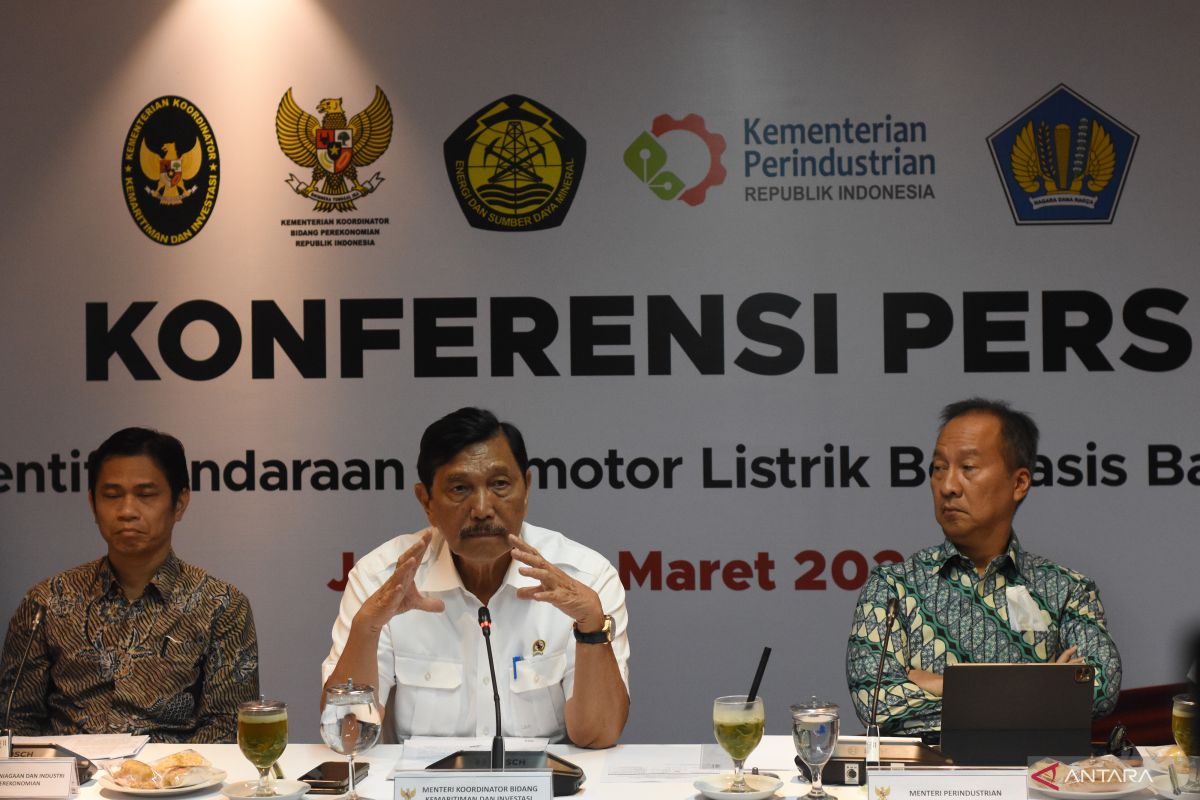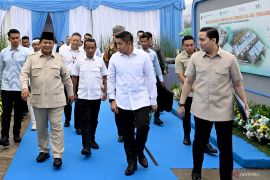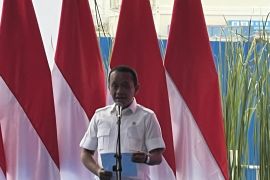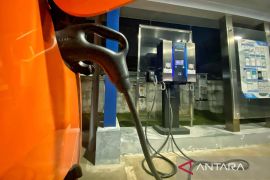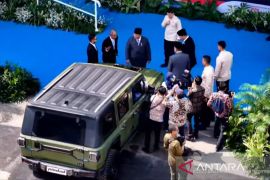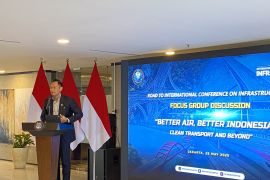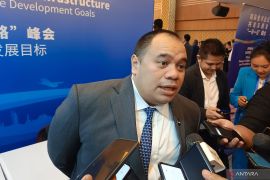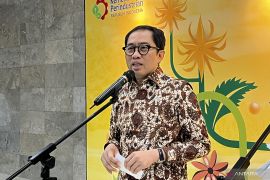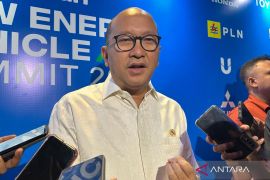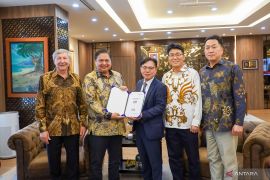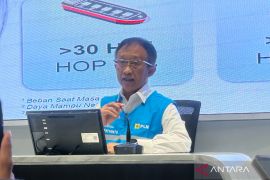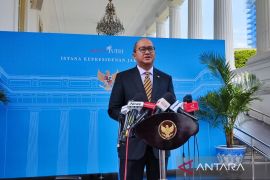However, EVs, both two-wheeled and four-wheeled, have been seen traversing the roads of the capital city. Moreover, several online ojek (motorcycle taxi) drivers are using electric motorcycles to transport people and goods.
Moreover, a switch was made from vehicles serving as modes of public transportation, such as TransJakarta buses, to the use of electric buses to transport passengers living in the outskirts of Jakarta that came along with an improvement in the transportation service.
This phenomenon is supported by the Indonesian Government, which has since the start, paid special attention to the high demand for EVs in tandem with the development green technology and lifestyles.
Technical aid has been provided, starting from the mandate to use EV as state vehicle, including for G20 events, and the provision of General Electric Vehicle Charging Stations (SPKLUs) at several places.
Moreover, investment convenience provided through the Job Creation Law is expected to support potential investment for the management of nickel, the EV battery's primary source, which foreign investors are seeking.
At the regional level, Indonesia, which holds the reins of the ASEAN chair in 2023, also raised this theme as one of the important economic agendas.
This is done in consideration of the fact that the region has adequate resources to develop the electric vehicle ecosystem.
Indonesia believes that the development of the EV ecosystem from upstream to downstream can be done in the ASEAN.
This development includes investment for EV production, formation of supply chain for spare parts, including battery and management of battery waste.
Subsidy
The government's latest policy in supporting the EV ecosystem in Indonesia is the provision of the battery electric vehicle purchase incentive starting from March 20, 2023.
The amount of the incentive reached Rp7 million, or US$451,565 per units, for the purchase of 200 thousand new electric motorcycle units.
This US$451,565 incentive will also be provided for the conversion of 50 thousand fossil-fueled conventional motorcycles to EV.
The government also plans to provide incentive for 35,900 units of four-wheeled EVs and 138 units of electric buses until December 2023. However, the detail from this plan is being discussed.
Coordinating Minister for Maritime Affairs and Investment Luhut Binsar Pandjaitan expects that the incentive program can provide greater affordability to improve the people's purchasing power for EVs.
Industry Minister Agus Gumiwang Kartasasmita explained that the EV incentive aid, which awaits the issuance of technical regulation, will be delivered to consumers and EV producers.
The incentive aid is given to EV producers that meet the 40-percent domestic-component level (TKDN) as stipulated within the system.
Thus far, two four-wheeled vehicle producers -- Hyundai and Wuling -- meet the requirements. Meanwhile, two-wheeled vehicle producers -- Gesits, Volta, and Selis -- have meet the 40-percent TKDN requirement.
For the early stage, electric motorcycle producers, who meet the criteria, are expected to not raise the selling price throughout the aid provision period and are committed to producing motorcycles within the established amount.
Next, micro, small and medium enterprises (MSMEs) are prioritized as the recipient target for the government's aid for the conversion of conventional motorcycles.
Specifically, the targeted MSMEs are those that receive the people's business credit (KUR) and micro enterprise productive aid (BPUM). These MSMEs are also consumers of 450 to 900 VA electricity.
In connection with this, the Energy and Mineral Resources Ministry is aiming to have five percent of the existing conventional motorcycles to be converted to EVs.
In other words, the ministry is planning to convert six million units by 2030 to save fuel oil by Rp3 trillion, or US$193.46 million, per year.
In addition to providing convenience to the people in purchasing and supporting EV producers, the incentive, which was promised since the end of 2022, also serves as a stimulus to attract investment to Indonesia.
The government is currently negotiating with electric automotive manufacturers Tesla Inc from the US and BYD from China with regard to this investment.
Moreover, this policy can provide other economic benefits in the form of economic turnover of expenditure on conversion components and repair services.
The plan can also support the role of educational institutions to encourage the acceleration of human resources' readiness and technology adoption through research and development.
Positive response
When the discourse concerning this incentive emerged, General Chairman of the Indonesian Automotive Industry Association (Gaikindo) Yohannes Nangoi believes that the policy will increase the sales of electric and hybrid vehicles.
The people's potential interest over purchasing EVs in the future is estimated to be very high, so the subsidy is seen as the right move.
On a separate occasion, Head of the Indonesian Electric Motorcycle Dealer Association (Ademoli) Indra Novint Noviansyah welcomed the subsidy from the government since it supports the underprivileged that are looking to transition to EVs.
According to Noviansyah, several electric motorcycle dealers have received purchase messages for the next two weeks that reflects the people's high level of enthusiasm.
In fact, several dealers have already started to open the pre-order option for the subsidized units.
In addition to the public, electric motorcycle dealers also support the program and will make all-out efforts to meet the targeted quota to support the EV ecosystem.
Transportation Lecturer at the University of Gadjah Mada (UGM) Agus Taufik Mulyono also commended and supported the incentive since the discourse concerning this policy had spread since last year.
In the long term, the policy can reduce emissions in the transportation sector that lowers the impacts of climate change and global warming.
The policy is also beneficial to reach the Net Zero Emission (NZE) target by 2060 or earlier.
Despite this, he encouraged the government to prioritize the EV conversion incentive rather than the new vehicle purchase incentive.
The use of EVs should also be directed toward the provision of electric mass transportation, such as electric buses or trains.
Moreover, the government should ensure the development of adequate road networks to support the goal of providing smart transportation.
Thus, this incentive is an advanced step to develop the electric vehicle industry and to realize the use of clean energy with minimal pollution. This step should certainly be accompanied by consistent and continuous policy implementation.
If it succeeds, it will give the national economy a new injection of life, considering that JP Morgan has projected that the EV industry will become a primary industry in Indonesia within the next few years.
Related news: Maritime Affairs and Investment Ministry inducts EVs in fleet
Related news: Expect EVs to help reduce fuel consumption: minister
Editor: Rahmad Nasution
Copyright © ANTARA 2023
